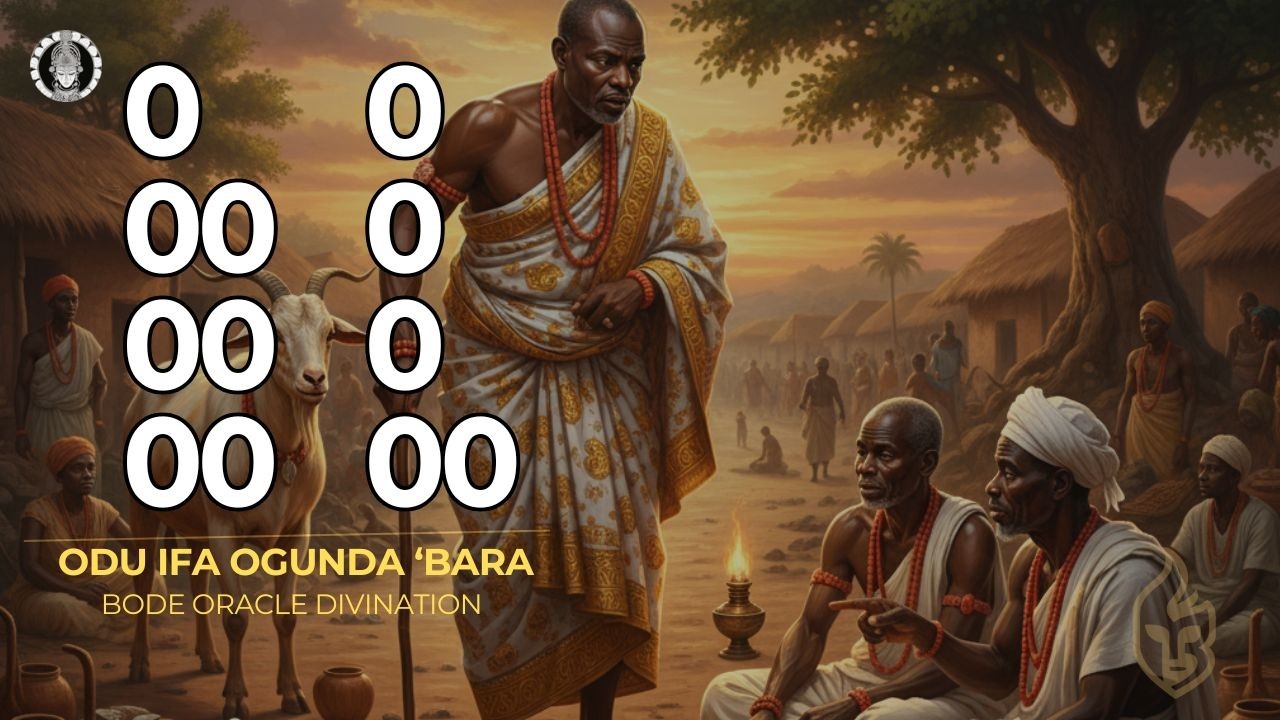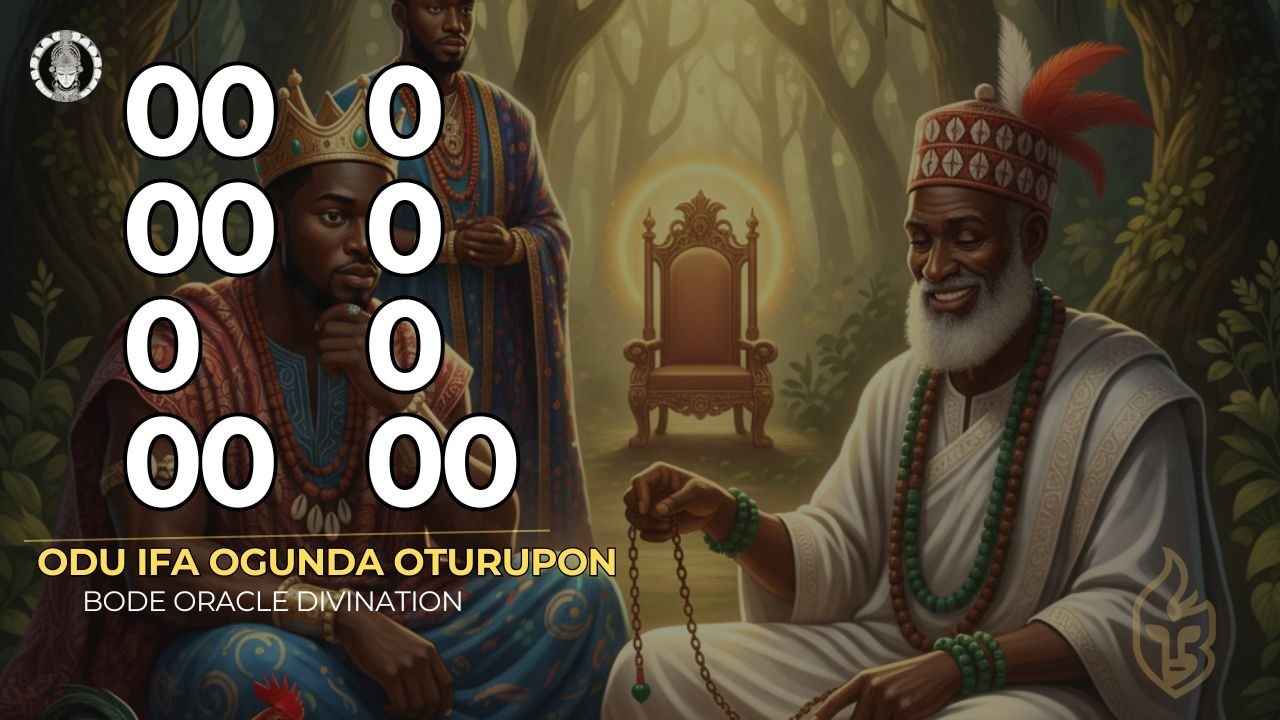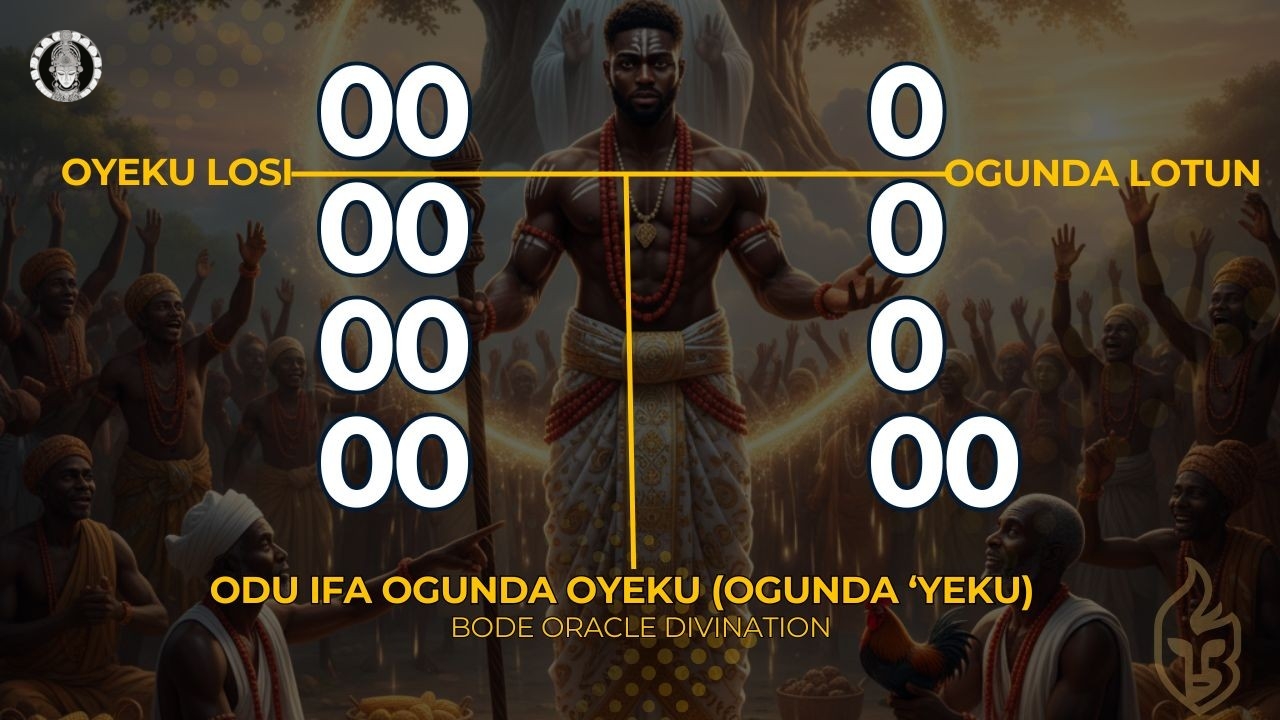Introduction to Odu Ifa Ogunda Oyeku (Ogunda Yeku)
Odu Ifa Ogunda Oyeku, also known as Ogunda Yeku, represents one of the 256 sacred divination signs in the Ifa corpus. This profound Odu carries essential messages about the blessing of immortality, safe journeys and travel, unwavering faith in spiritual provisions, and the accumulation of multiple blessings through longevity. Through the wisdom of Ogunda Oyeku, we learn that proper sacrifice creates spiritual protection that shields us from premature death, ensures safe passage through life's journeys, and opens channels for wealth, family, and prosperity.
The divinations within Ogunda Oyeku address fundamental human concerns: the safety of loved ones who travel, the desire for long life to enjoy one's blessings, the patience required when blessings seem delayed, and the relationship between longevity and prosperity. Each story serves as both practical guidance and spiritual instruction, teaching us that through proper sacrifice and unwavering faith in Ifa, we can transform fear into confidence and scarcity into abundance. For comprehensive understanding of the complete Odu Ifa system, explore our detailed directory.
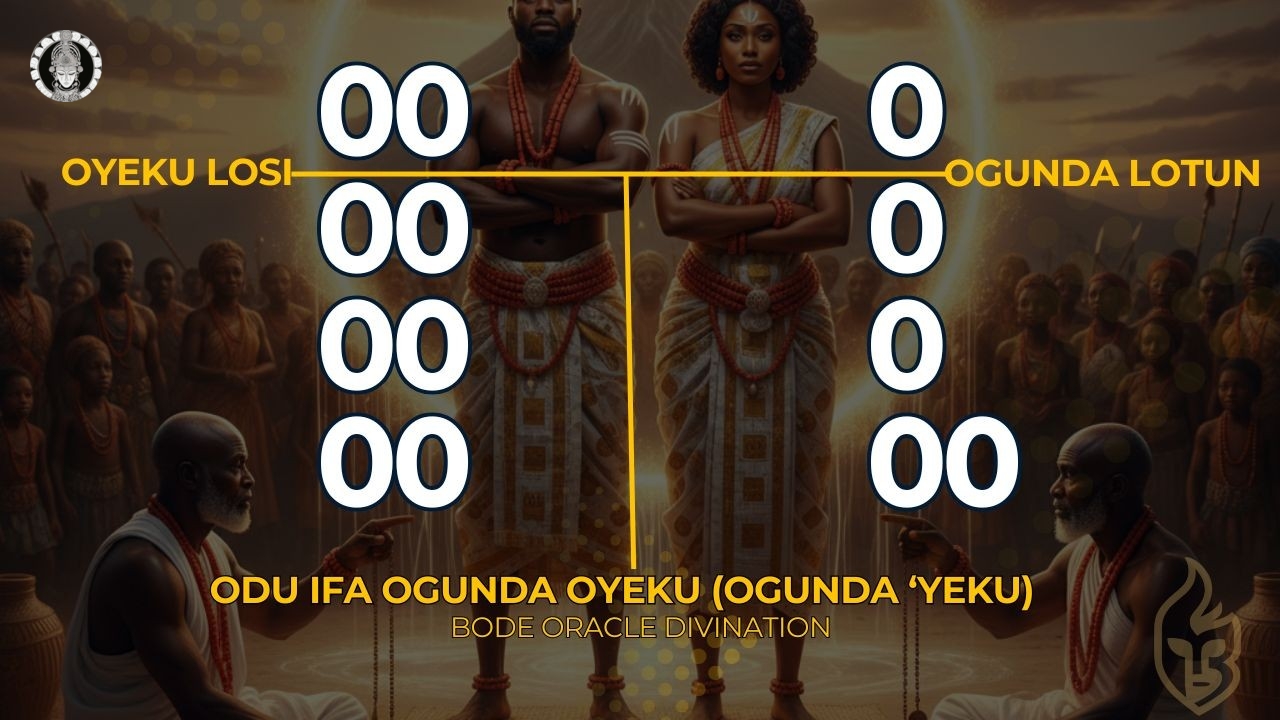
Ifa Divination for Orunmila: Protection for Travelers and Safe Journeys
Understanding the Message of Travel Protection
This divination from Ogunda Oyeku addresses one of the most universal human experiences—the anxiety and concern we feel when those we love embark on journeys or travel to distant places. Ifa reveals the story of Orunmila himself, the grand prophet and master of divination, sending two of his children on a journey. Despite his vast spiritual knowledge and power, Orunmila experienced the same worry any parent feels when their children leave home.
The divination specifically speaks to two situations that require sacrifice: when one is personally embarking on a journey, and when one is sending someone else on an errand or trip to a distant place. In both cases, Ifa instructs that sacrifice must be performed before departure to avoid regret. The emphasis on avoiding regret suggests that without proper spiritual preparation, tragedy can occur during travel, leading to permanent grief and sorrow.
The Universal Nature of Parental Concern
What makes this divination particularly powerful is that it features Orunmila himself as the protagonist. If even the father of divination, the one who possesses all spiritual knowledge, must offer sacrifice for his children's safe journey, how much more do ordinary mortals need this protection? This teaches humility—no amount of spiritual knowledge exempts us from following Ifa's prescriptions. Even the most powerful spiritual practitioners must maintain proper spiritual protocols.
The Sacred Verse
Ogunda o ku
Oye oku
Aiku loloja ntora
Adifafun orunmila
Baba o ranmo meji lajo
Baba ji ni jojumo oun komi nu won
Ebo won ni ose
O si gbebo nibe orubo
Nje morogunda moroye
Iku omo
Nje morogunda moroye
Iku omo pomoni
English Translation
Ogunda has not died,
Oye has not died.
The blessing of immortality that brings favor.
Ifa divination was cast for Orunmila,
Who was sending two children on a journey.
He woke up in the morning worried about them.
He was instructed to offer a sacrifice,
And he complied.
Therefore, I am Ogunda and Oye.
The death of a child will not occur.
For I have seen Ogunda and Oye,
And the death of a child shall not befall us.
The Power of the Refrain
The phrase "Ogunda has not died, Oye has not died" serves as both declaration and invocation. By stating that the components of the Odu name have not died, the verse affirms the power of immortality and protection inherent in this Odu. When devotees recite "I am Ogunda and Oye, the death of a child will not occur," they are not merely making a statement but actively invoking the protective power of this Odu to shield their loved ones from harm during travel.
The Spiritual Mechanics of Travel Protection
Travel exposes people to unfamiliar spiritual territories and energies. When we leave our home environment, we leave behind the protective spiritual forces that know and guard us. We enter spaces where unknown spirits dwell, where our destiny may intersect with negative energies, or where accidents orchestrated by spiritual forces can occur. The sacrifice prescribed by Ogunda Oyeku creates a spiritual shield that travels with the person, ensuring safe passage through these potentially dangerous territories.
Prescribed Offerings (Ebo)
For protection during travel and ensuring safe journeys, Ifa prescribes two roosters (akuko adie meta), a large sum of money (opolopo owo), and a pigeon (eyele). The roosters represent alertness and the announcement of safe arrival—just as the rooster crows at dawn, so shall the traveler announce their safe return. The pigeon symbolizes peace and gentle passage, ensuring that the journey proceeds smoothly without conflict or danger. The money facilitates the spiritual transaction, compensating the spiritual forces that will provide protection along the journey. To understand more about the sacred divination tools used in Ifa practice, explore scholarly documentation.
Ifa Divination for Onile: Faith, Patience, and the Certainty of Blessings
Confronting Spiritual Doubt and Impatience
This divination from Ogunda Oyeku addresses one of the most challenging spiritual tests—maintaining faith when blessings seem delayed or absent. Ifa reveals the story of Onile Kere Ope, who was waiting for blessings to manifest in his life. The name "Onile Kere Ope" itself carries meaning: "the owner of a small house gives thanks," suggesting someone of modest means who nonetheless maintains gratitude and spiritual devotion.
The divination speaks directly to a common human struggle: we perform our sacrifices, maintain our spiritual practices, and yet the expected blessings seem not to arrive. In such moments, doubt creeps in. We begin to wonder if Ifa has forgotten us, if our sacrifices were insufficient, or if blessings will ever come. Ogunda Oyeku provides profound reassurance against these doubts.
The Sacred Verse
Lodun lodun ni won ko ile kin
Losu losu ni won yo odede imo
Kirimun kirimun
Adifafun onile kere ope
Ogunka mo si yele
Ebo won ni ose
O si gbebo nibe orubo
Nje ope segi segi
Ifa ni mo sele lorun
English Translation
Every year, the house of Ifa is built, along with the sacred kola nut.
Once a month, access to the palm source is restored.
Kirimun Kirimun.
Ifa divination was cast for Onile Kere Ope,
Who was waiting for blessings to come.
He was instructed to offer a sacrifice,
And he complied.
Therefore, Ope segi segi segi.
Ifa says it has made blessings available for me.
Understanding Cycles and Seasons of Blessing
The verse begins with profound imagery about cycles: "Every year, the house of Ifa is built" and "Once a month, access to the palm source is restored." This teaches that blessings operate in cycles and seasons. Just as we rebuild Ifa shrines annually and harvest palm products monthly according to natural cycles, so too do spiritual blessings have their appointed times of manifestation.
The yearly rebuilding of Ifa's house represents renewal and recommitment to spiritual practice. The monthly restoration of access to the palm source (which provides palm wine, palm oil, and other essential resources) represents regular, dependable provision. These images assure us that just as natural cycles are reliable, so too are spiritual provisions reliable when we maintain proper relationship with Ifa.
The Critical Instruction: Never Doubt
Ifa's message to Onile Kere Ope contains a critical instruction: "ko si mo se iye meji, pe lodo ifa ni oore re wa" (never doubt, for it is through Ifa that your blessings will come). This is not mere positive thinking or empty reassurance. It is a spiritual principle: doubt acts as a barrier that blocks the flow of blessings from the spiritual realm into physical manifestation.
When we doubt, we essentially close the door through which blessings must pass. Faith, on the other hand, keeps that door open. The instruction to never doubt Ifa means maintaining certainty that the prescribed sacrifices have been received, that spiritual forces are working on our behalf, and that blessings will manifest in their appointed time.
The Declaration of Availability
The verse concludes with Ifa's powerful declaration: "Ifa ni mo sele lorun" (Ifa says it has made blessings available for me). This teaches that blessings are not absent—they are already prepared and waiting in the spiritual realm. The sacrifice and faith act as the bridge that brings these already-existing blessings from the spiritual dimension into physical reality. Our role is not to create the blessings (Ifa has already done that) but to position ourselves through proper sacrifice and unwavering faith to receive what has been prepared.
Prescribed Offerings (Ebo)
For those experiencing delays in blessings and needing to strengthen their faith, Ifa prescribes pigeons (eyele), a rooster (akuko adie), and a large sum of money (opolopo owo). The pigeons represent peaceful reception of blessings without conflict or competition. The rooster symbolizes the announcement and manifestation of what has been hidden, just as the rooster's crow announces the dawn. For deeper understanding of Yoruba spiritual philosophy, consult UNESCO's documentation on Ifa divination of the Yoruba people.
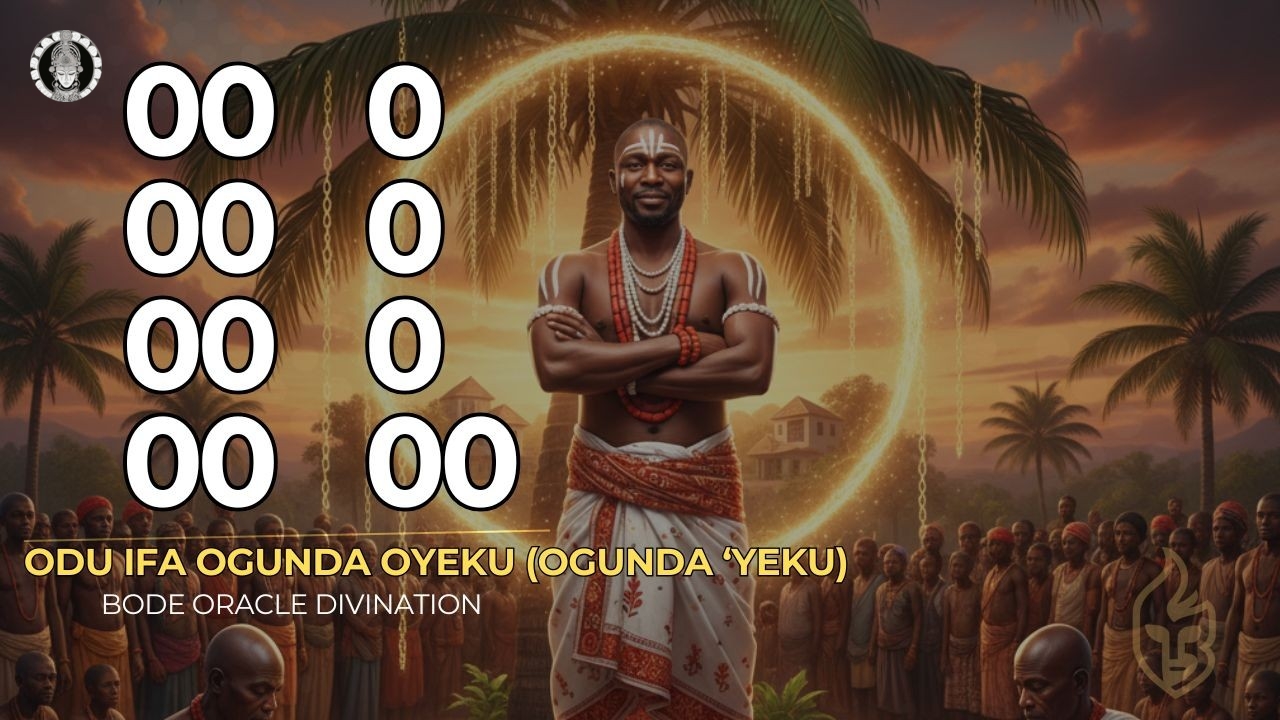
Ifa Divination for Oke: The Blessing of Immortality for Couples
The Sacred Union and Shared Longevity
This divination from Ogunda Oyeku presents a unique and profoundly beautiful message about marriage, partnership, and the blessing of growing old together. Ifa reveals that both the person receiving this divination and their spouse must offer sacrifice jointly to receive the blessing of immortality. The emphasis on joint sacrifice highlights a critical spiritual principle: in marriage, spiritual protection and blessing work most powerfully when both partners participate together in spiritual practice.
The divination addresses a universal human desire—not just to live long, but to live long together with one's beloved. What good is longevity if one partner dies young, leaving the other to age alone? Ogunda Oyeku promises that through proper joint sacrifice, both partners will enjoy long life, witnessing each other through old age, sharing memories accumulated over decades, and supporting each other through all seasons of life.
The Sacred Verse
Ogunda oku
Oye o ku
Aiku lagba lagba meji fin ra won
Adifafun oke eyi to soko aiku
Ebo woni o se
O si gbebo nibe o rubo
Nje oke aroraiku lorun
English Translation
Ogunda has not died.
Oye has not died.
It is with immortality that two elders were able to witness the other.
This was the Ifa divination for the mountain that will marry immortality.
The mountain was advised to offer sacrifice,
And it complied.
Thus, the mountain has been destined for immortality.
The Symbolism of Oke (Mountain)
The protagonist of this divination is Oke (mountain), a symbol of permanence, stability, and endurance. Mountains stand through countless generations, witnessing ages come and go. By using the mountain as the subject who "marries immortality," Ifa teaches that just as mountains endure through time, so can human relationships endure when properly spiritually fortified. The mountain doesn't merely exist alongside immortality—it marries it, suggesting intimate union with the principle of longevity.
Why Two Elders Must Witness Each Other
The phrase "It is with immortality that two elders were able to witness the other" contains profound wisdom. In Yoruba culture, elders (agba) command respect, possess wisdom, and represent living libraries of knowledge and experience. To become an elder together with one's spouse represents the highest achievement in marriage—not just surviving together, but thriving together, accumulating shared wisdom, and becoming jointly respected pillars of the community.
The word "witness" (fin ra won) is particularly significant. It means to see each other clearly, to observe each other's transformation, to be present for each other's journey. Marriage without longevity means one partner witnesses the other's death prematurely. Marriage with immortality means both partners witness each other's full life journey, from youth through middle age into honored elderhood.
The Spiritual Principle of Joint Sacrifice
Ifa specifically instructs that both husband and wife must offer sacrifice together (ki oun ati iyawo re ki won jo rubo). This joint offering creates spiritual symmetry and balance. When only one partner offers sacrifice, spiritual protection remains unbalanced—one may be shielded while the other remains vulnerable. Joint sacrifice creates a unified spiritual field that protects both partners equally, ensuring that neither outlives the other by many years, which would cause grief.
Prescribed Offerings (Ebo)
For the blessing of immortality for couples, Ifa prescribes a rooster (akuko), a goat (oruko), and a large sum of money (opolopo owo). The rooster represents male vitality and longevity, the goat represents strength and resilience, and the money facilitates the spiritual exchange. Both partners should participate in presenting these offerings, symbolically stating their joint commitment to long life together. To explore the mathematical and symbolic structure of Ifa, review research on the algebraic characterization of Ifa divination codes.
Ifa Divination for Aikulola: Immortality as the Foundation of All Blessings
Understanding the Primacy of Life
This divination from Ogunda Oyeku presents perhaps the most comprehensive message in the Odu, revealing that immortality (longevity) serves as the foundation upon which all other blessings rest. Ifa speaks to Aikulola, whose name means "immortality brings wealth/honor," and reveals that he will receive multiple blessings: wealth, a new wife, children, and all forms of goodness. However, the verse makes clear that all these blessings flow from one primary blessing—the blessing of long life.
The divination addresses someone who has been crying for blessings (n momi oju so gbere ire), suggesting desperation or prolonged waiting. Ifa responds not by promising the specific blessings immediately, but by revealing the spiritual sequence: first comes immortality, then all other blessings follow naturally. This teaches that without life, no blessing matters; with life, all blessings become possible.
The Sacred Verse
Ma sere maku
Masika maku
Ile lomo eni to te oun pe
Adifafun aikulola tii se iponti orisa
Igba ti n momi oju so gbere ire
Ebo won ni ose
O si gbebo nibe orubo
Nje, talopon dundun ta fi laje moranhi ?
Aiku lopon didun
Talo pon didun ta fi laya monrinhin ?
Aiku lopon didun
Talopon didun tafi bimo monrinhin ?
Aiku lopon didun
Ta lopon didun ta finire gbogbo monrinhin ?
Aiku lo pondidun
English Translation
If you do good, you will die later.
If you do evil, you will die later.
Whatever is sown is what will be reaped.
This was the Ifá divination for Aikulola,
The son of the intimate fraternity of the deity.
When he was crying for the blessings of goodness,
He was advised to offer sacrifice,
And he complied.
What made the blessing of wealth come to him?
The blessing of immortality.
What made the blessing of a new wife come to him?
The blessing of immortality.
What made the blessing of motherhood come to him?
The blessing of immortality.
What made the blessing of all goodness come to him?
The blessing of immortality.
The Law of Spiritual Reciprocity
The verse opens with a profound philosophical statement: "If you do good, you will die later. If you do evil, you will die later." This acknowledges the reality that death comes to all eventually. However, it teaches that the quality and timing of death depend on what we sow in life. Those who sow good deeds, proper sacrifice, and righteous conduct reap blessings, peaceful longevity, and honored transitions. Those who sow evil reap suffering, premature death, and disgraceful endings.
The statement "Whatever is sown is what will be reaped" (Ile lomo eni to te oun pe) emphasizes personal responsibility. We cannot blame others for our misfortunes if we have sown spiritual negligence. Conversely, we can claim our blessings with confidence when we have properly planted the seeds through sacrifice and righteous living.
The Repetitive Teaching Structure
The verse employs powerful repetition, asking four times what made various blessings come to Aikulola, and answering each time "the blessing of immortality." This repetition serves multiple purposes: it emphasizes the point beyond any possible misunderstanding, it creates a rhythmic incantation that devotees can recite when seeking blessings, and it demonstrates that immortality is not just one blessing among many but the source-blessing from which all others flow.
Why Immortality Precedes Wealth
The first question asks what made wealth come to Aikulola. Ifa answers: immortality. This teaches that wealth requires time to accumulate. Those who die young cannot build substantial wealth. Moreover, even if they inherit wealth, they cannot enjoy it. Longevity provides the time needed to build businesses, establish reputation, accumulate resources, and enjoy prosperity. Without life, wealth serves no purpose.
Why Immortality Precedes Marriage and Children
The questions about wife and children reveal deeper truths. A new wife requires a living husband to cherish her. Children require living parents to raise them. What benefit is a wife if one dies shortly after marriage, leaving her a widow? What good are children if one dies before seeing them grow? Immortality ensures that one lives to enjoy marriage, raise children, see grandchildren, and build lasting family legacy.
The Role of Orisa Obatala
The divination notes that Aikulola must appease Orisa Orisanla (Obatala) with Ori (shea butter). Obatala, the deity of creation and purity, governs the formation of human bodies and the essence of life itself. By appeasing Obatala with ori (which represents one's destiny and consciousness), Aikulola acknowledges that life and longevity come from the creator deity. This additional offering complements the general ebo, addressing the spiritual root of existence itself.
Prescribed Offerings (Ebo)
For receiving multiple blessings anchored in longevity, Ifa prescribes a dove (eyele), a rooster (akuko adie), and a large sum of money (opolopo owo), plus shea butter (ori) to appease Obatala. The dove represents peace and gentle accumulation of blessings without conflict. The rooster symbolizes announcement and manifestation of hidden provisions. Understanding more aspects of Ifa spirituality enhances appreciation of these sacred prescriptions.
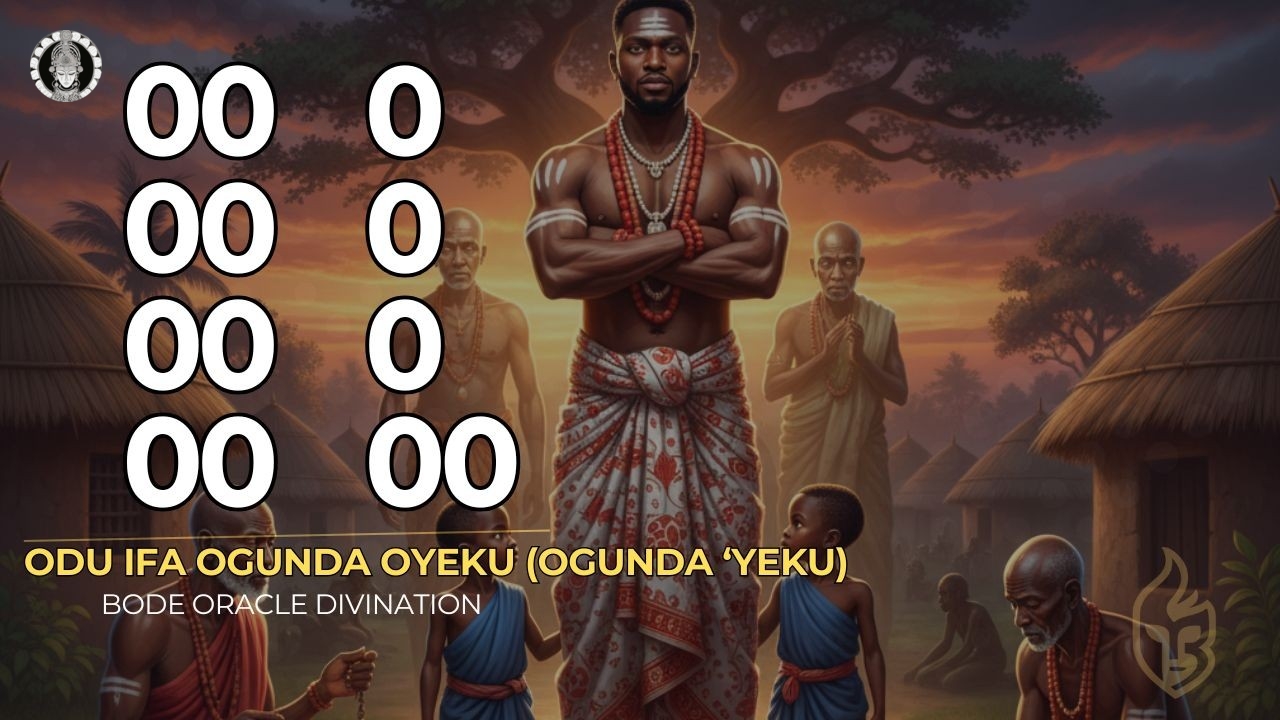
Akose and Spiritual Preparations of Ogunda Oyeku
Understanding Akose in Ifa Practice
Akose refers to spiritual preparations or medicinal formulations that combine herbal, animal, and mineral substances with spiritual invocations to produce specific results. Unlike ebo (sacrifices), which are offered to spiritual forces, akose are preparations that the person uses directly on their body or environment. The akose of Ogunda Oyeku are particularly powerful for attracting wealth and achieving victory over enemies.
Awure Ola: Spiritual Preparation for Great Wealth
This akose is specifically designed to attract substantial wealth, prosperity, and financial honor into one's life. The preparation creates a spiritual magnetic field around the person that draws opportunities, favorable circumstances, and material abundance.
Ingredients and Preparation
The akose requires Areyinkosun herb, a kola nut (obi) placed in front of Esu, and three cowries without any dents or damage (owo eyo ti ko luju meta). These ingredients are ground together with black soap (ose dudu). The mixture is then placed inside a used and broken calabash (paka idi esu) positioned in front of Esu, and one must bathe with it every morning.
Spiritual Significance of the Ingredients
Areyinkosun herb is known in Yoruba herbalism for its properties of attraction and favor, drawing positive attention and opportunities. The kola nut represents elevation, honor, and the breaking of barriers—just as kola nut opens ceremonies and relationships, it opens doors to wealth. The three perfect cowries symbolize money, trade, and commerce without defects or obstacles. Black soap provides spiritual cleansing while carrying the other ingredients' properties into the person's aura.
The Role of Esu in Wealth Attraction
Placing the preparation in front of Esu is critical. Esu controls the crossroads where opportunities meet preparation, where effort meets reward, where intention meets manifestation. By positioning the akose before Esu, one ensures that the trickster deity, who can open or close doors of opportunity, works in one's favor. Esu becomes the active agent who directs wealth-attracting energies toward the devotee.
The Broken Calabash Symbolism
Using a broken calabash (paka idi) might seem counterintuitive, but it carries important symbolism. The broken vessel represents the breaking of limitations, the shattering of poverty consciousness, and the opening of previously closed containers. Just as the calabash is broken open to reveal its contents, so too will hidden wealth be broken open and revealed to the devotee.
Proper Application
Bathing with this preparation every morning ensures that one carries the wealth-attracting energy throughout the day, into every interaction, every business dealing, every opportunity. Morning application is strategic—it prepares the person spiritually before engaging with the world, ensuring they move through the day radiating the frequency of prosperity.
Isegun Ota: Spiritual Preparation for Victory Over Enemies
This akose provides spiritual warfare capabilities, enabling one to defeat enemies, overcome opposition, and emerge victorious in conflicts. It creates a protective and offensive spiritual shield that neutralizes attacks and returns them to their source.
Ingredients and Preparation
The akose requires the root of the Lapalapa plant (also called the Iyalode tree or Egbo iya lode). This root is ground together with black soap (ose dudu), and one must bathe with it every night before going to bed. Critically, after bathing, one must not go anywhere until the next morning (ti aba ti fiwe tan, ao ni jademo o odi aro ojo keji kato jade).
The Power of Iyalode Root
The Iyalode tree derives its spiritual potency from its association with female leadership, authority, and protective power. In Yoruba society, the Iyalode is the female chief who represents and protects women's interests. The tree that bears this name carries similar protective and authoritative energies. Its root, buried deep in the earth, represents hidden power, foundation strength, and the ability to withstand storms while remaining firmly planted.
Why Night Application
Bathing at night before sleep is strategically important. During sleep, we are most spiritually vulnerable—our conscious defenses are lowered, our spirits travel, and enemies can launch attacks in the dream realm. Applying Isegun Ota before bed creates a spiritual fortress around the sleeping person, ensuring that any attacks launched during the night are repelled. The requirement to remain indoors after bathing ensures the protective coating remains undisturbed and fully active.
The Restriction on Movement
The instruction not to go anywhere after bathing (ao ni jademo o odi aro ojo keji) serves multiple purposes. First, it ensures the spiritual preparation has time to fully integrate into the person's aura without interference. Second, it prevents the protective coating from being disrupted by encountering other energies. Third, it teaches spiritual discipline—the person must plan their evening accordingly, ensuring all external activities are completed before the ritual bath.
Important Considerations for Akose Use
Both akose preparations should only be used under the guidance of a qualified Babalawo who can properly invoke the necessary incantations (ofo ase) and ensure correct preparation. The spiritual power of akose comes not merely from the physical ingredients but from the prayers, invocations, and spiritual knowledge that accompany their preparation and use. The Babalawo must determine the appropriate duration of use, any additional rituals needed, and modifications based on individual circumstances. For scholarly perspectives on Ifa as a knowledge system, explore UNESCO's recognition of the Ifa divination system.
Additional Resources
Internal Links
- Complete Guide to Ogunda Oyeku - Detailed information, taboos, and practices
- Bode.ng Blog - Extensive collection of Ifa and Yoruba spirituality articles
- Complete Odu Ifa Directory
- Bode Oracle - Home page for divination services and community
External Resources
- African Traditional Religions: Ifa Divination - Duquesne University
- Ifa of the Yoruba People of Nigeria - UNESCO
- Algebraic Characterization of Ifa Main Divination Codes
- UNESCO Recognition of Ifa Divination System
- Ifa Divination System - Wikipedia
- Opon Ifa (Divination Tray) - Wikipedia
Connect With Us on Social Media
- BODE Oracle on TikTok
- BODE Oracle on YouTube
- BODE Oracle on Facebook
- BODE Oracle on X (Twitter)
- BODE Oracle on Pinterest
Visit Bode.ng to explore more divination teachings, participate in quizzes and polls, and connect with our community of practitioners and learners. Register today to access exclusive content and personalized guidance on your spiritual journey.
Frequently Asked Questions And Answers About Odu Ifa Ogunda Oyeku (Ogunda Yeku)
Find answers to common questions about this sacred Odu Ifa and its divination teachings
Ogunda Oyeku, also called Ogunda Yeku, is one of the 256 sacred Odu (divination signs) in the Ifa corpus. It carries powerful messages about immortality, safe journeys, blessings of longevity, wealth attraction, and spiritual protection. This Odu teaches that through proper sacrifice and faith in Ifa, one can overcome death, ensure safe travels, and receive abundant blessings including wealth, spouse, and children.
The divination of Orunmila in Ogunda Oyeku emphasizes the critical importance of offering sacrifice before embarking on journeys. When sending children or others on errands to distant places, sacrifice must be performed to avoid regret. The verse demonstrates Orunmila's concern for his two children traveling, and through proper sacrifice, death was prevented. This Odu promises that those who comply with its prescriptions will travel safely and return home without incident.
Ogunda Oyeku contains multiple divinations specifically addressing immortality (aiku). The divination for Oke teaches that couples should offer sacrifice together to receive the blessing of immortality. The verse states "It is with immortality that two elders were able to witness the other," meaning longevity allows spouses to grow old together. The Odu promises that compliance with prescribed offerings prevents premature death and grants long life to both partners.
The divination for Onile Kere Ope teaches profound lessons about patience and faith. The verse states "Every year, the house of Ifa is built" and "Once a month, access to the palm source is restored," showing that blessings come in cycles and seasons. Ifa instructs that one must never doubt—blessings are already available through Ifa. The key is offering sacrifice and maintaining unwavering faith that Ifa has made provisions accessible.
The divination for Aikulola demonstrates that immortality is the foundation for all other blessings. The verse asks repeatedly what made wealth, wife, children, and all goodness come to Aikulola, and the answer each time is "the blessing of immortality." This teaches that longevity enables one to accumulate and enjoy blessings. Without life, no other blessing matters. Therefore, Ogunda Oyeku prioritizes the blessing of long life as the gateway to wealth, family, and prosperity.
The divination for Oke specifically instructs that both husband and wife must offer sacrifice together for immortality. This joint offering symbolizes unity, shared destiny, and mutual spiritual protection. When couples align spiritually through joint sacrifice, they create a protective shield around their union. Ifa promises that when both partners participate in the offering, they will both enjoy longevity and witness each other through old age—a blessing that cannot be achieved individually.
Awure Ola is a spiritual preparation for attracting great wealth and fortune. It combines Areyinkosun herb, a kola nut placed before Esu, and three cowries without dents, ground together with black soap. This mixture is placed in a broken calabash in front of Esu, and one must bathe with it every morning. The kola nut represents elevation and honor, cowries symbolize money and trade, and Areyinkosun herb brings attraction and favor. Bathing with this preparation daily aligns one's spiritual frequency with abundance.
Isegun Ota is a spiritual preparation for victory over enemies. It uses the root of the Lapalapa plant (also called Iyalode tree), ground with black soap. One must bathe with it every night before bed, and after bathing, must not go anywhere until the next morning. The Iyalode tree root represents female leadership and protective authority. Bathing at night creates a spiritual boundary around the person during vulnerable sleeping hours, when spiritual attacks are most likely. Remaining indoors after the bath ensures the protective coating remains undisturbed.
This powerful refrain appears throughout Ogunda Oyeku's verses, declaring that both Ogunda and Oye (components of the Odu name) have not died, representing the triumph over death. It serves as an incantation and affirmation of immortality. When devotees recite "I am Ogunda and Oye, the death of a child will not occur," they invoke the Odu's protective power against premature death. This phrase transforms the divination into a living prayer that actively prevents death when spoken with faith and proper sacrifice.
This profound statement in the Aikulola divination teaches the law of spiritual reciprocity. The verse states "If you do good, you will die later. If you do evil, you will die later," acknowledging that death comes to all eventually. However, the quality of life and timing of death depend on what we sow spiritually. Those who plant good deeds, proper sacrifice, and righteous conduct reap blessings, longevity, and peaceful transitions. Those who sow evil reap suffering and premature death. The Odu emphasizes personal responsibility in shaping one's destiny.
All sacrifices (ebo) and spiritual preparations (akose) in Ogunda Oyeku should be performed under the guidance of a qualified Babalawo (Ifa priest). The priest ensures proper procedures, invokes necessary incantations, and determines the appropriate timing for offerings. Different divinations within Ogunda Oyeku require different offerings: roosters and pigeons for safe journeys, goats and roosters for immortality, and doves and roosters for wealth. The spiritual power comes from both the materials and the prayers that accompany them.
You can explore comprehensive information about Ogunda Oyeku through several resources:
- Complete Guide to Ogunda Oyeku - Detailed taboos and practices
- Bode.ng Blog - Extensive articles on Ifa spirituality
- Complete Odu Ifa Directory
- Bode.ng - Access divination services and community resources
Connect with us on social media for regular teachings: TikTok, YouTube, Facebook, X (Twitter), and Pinterest @BODEOracle.
